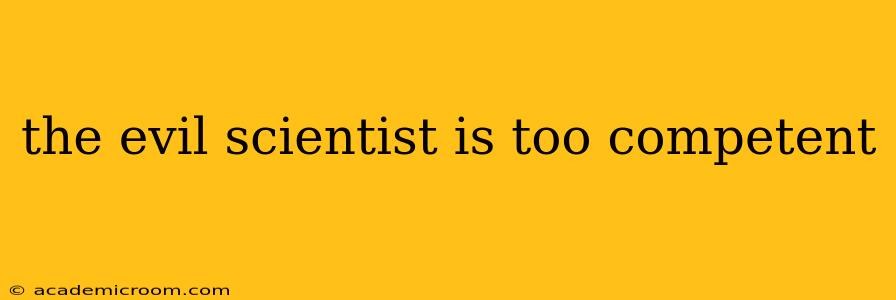The Evil Scientist Is Too Competent: Why Tropes Need Twists
The "evil scientist" is a classic villain archetype, often portrayed as a brilliant but morally bankrupt individual bent on world domination or some other nefarious scheme. However, a common criticism leveled against this trope is that the scientist is too competent. Their plans are flawlessly executed, their inventions impossibly advanced, and their foresight seemingly limitless. This lack of realistic flaws can make the villain feel less believable and diminish the tension of the narrative. But why is this the case, and how can writers avoid falling into this trap? Let's explore this intriguing narrative challenge.
Why is the "Too Competent" Evil Scientist a Problem?
This issue stems from a fundamental storytelling principle: conflict. A compelling narrative requires obstacles and challenges for the protagonist to overcome. An overly competent villain removes much of this conflict. If the villain's plans are always successful, the protagonist's efforts feel futile, and the story loses its dramatic tension. The audience might find themselves less invested in the outcome because the victory feels predetermined.
What Makes an Evil Scientist Believable?
A truly compelling evil scientist isn't defined solely by their intelligence. They should have believable flaws and vulnerabilities that create conflict and make their eventual downfall plausible. These flaws can manifest in various ways:
- Overconfidence: A brilliant mind might overlook crucial details or underestimate their opponents due to arrogance.
- Obsessive Focus: Dedication to their work can blind them to the ethical implications of their actions or to potential weaknesses in their plans.
- Underestimation of Others: The scientist might underestimate the resourcefulness and determination of those opposing them.
- Personal Flaws: Even the most intelligent individuals have weaknesses – emotional vulnerabilities, interpersonal difficulties, or addictions that can be exploited.
- Unforeseen Circumstances: No matter how well-planned, a scheme can be disrupted by unpredictable events or unforeseen technological glitches.
How to Write a Believable Evil Scientist?
Here's how to craft a more realistic and engaging evil scientist:
- Give them believable limitations: Their technology might have weaknesses or unintended consequences. Their plans might be complex but not infallible. They should face setbacks and challenges along the way.
- Create internal conflict: Introduce moral dilemmas or doubts that challenge their actions. Even an evil scientist might have moments of self-doubt or regret.
- Make them human: Give them relatable motivations, fears, and desires, even if those desires are twisted or malevolent.
- Focus on the journey, not just the destination: Don't just reveal their master plan at the end. Show the process, the setbacks, and the adaptations they make along the way.
What are common criticisms of overly competent villains?
This is a frequently asked question concerning character development. Often, overly competent villains feel less like characters and more like plot devices, solely existing to create conflict without a believable path to defeat. This diminishes audience engagement and can make the story feel less satisfying.
How can I make my evil scientist's plan more believable?
Consider incorporating realistic constraints. Limit access to resources, introduce unforeseen technical challenges, or have the plan rely on a complex chain of events that can easily break down. A believable plan is one that's ambitious but not impossible, leaving room for both success and failure.
Are there examples of well-written evil scientists who aren't overly competent?
Yes! Many fictional evil scientists avoid the "too competent" trope by incorporating the flaws discussed above. For example, consider the portrayal of villains in works where their arrogance or obsession leads to their ultimate downfall, offering a more satisfying and believable narrative.
By incorporating these elements, writers can craft compelling evil scientists who are intelligent and dangerous but also vulnerable and believable, resulting in a more engaging and satisfying story. The key is to strike a balance between brilliance and vulnerability, creating a character that's both intimidating and ultimately human.
